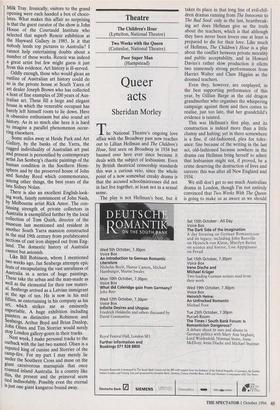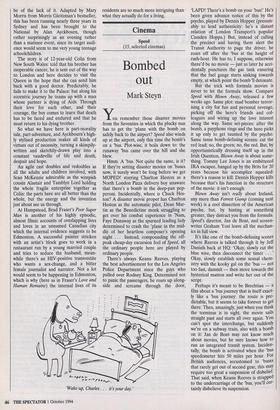Theatre
The Children's Hour (Lyttelton, National Theatre) Two Weeks with the Queen (Cottesloe, National Theatre) Poor Super Man (Hampstead)
Queer acts
Sheridan Morley
he National Theatre's ongoing love affair with the Broadway past now reaches out to Lillian Hellman and The Children's Hour, first seen on Broadway in 1934 but banned over here ever since because it deals with the subject of lesbianism. Even by British theatrical censorship standards this was a curious veto, since the whole point of a now somewhat creaky drama is that the accused schoolmistresses did not in fact live together, at least not in a sexual sense.
The play is not Hellman's best, but it takes its place in that long line of evil-chil- dren dramas running from The Innocents to The Bad Seed: only in the last, heartbreak- ing act does Hellman give us the truth about the teachers, which is that although they have never been lovers one at least is prepared to die for their love. Like much of Hellman, The Children's Hour is a play about the conflict between private morality and public acceptability, and in Howard Davies's rather slow production it elicits two immensely strong performances from Harriet Walter and Clare Higgins as the doomed teachers.
Even they, however, are outplayed, in the best supporting performance of this year, by Gillian Barge as the old dragon grandmother who organises the whispering campaign against them and then comes to realise, just too late, that her grandchild's evidence is tainted.
This was Hellman's first play, and its construction is indeed more than a little clumsy and halting; yet in there somewhere is a fine, if old-fashioned, plea for toler- ance: fine because of the writing in the last act, old-fashioned because nowhere in the drama can Hellman bring herself to admit that lesbianism might not, if proved, be a crime deserving the destruction of lives and careers: this was after all New England and 1934.
We still don't get to see much Australian drama in London, though I'm not entirely convinced that Two Weeks With The Queen is going to make us as aware as we should be of the lack of it. Adapted by Mary Morris from Morris Gleitzman's bestseller, this has been running nearly three years in Sydney and has been brought to the National by Alan Ayckbourn, though rather surprisingly as an evening rather than a matinee event, since its target audi- ence would seem to me very young teenage schoolchildren.
The story is of 12-year-old Colin from New South Wales: told that his brother has inoperable cancer, he is sent out of the way to London and here decides to visit the Queen in the hope that she can send him back with a good doctor. Predictably, he fails to make it to the Palace: but along his eccentric journey he teams up with a man whose partner is dying of Aids. Through their love for each other, and their courage, the boy comes to learn that death has to be faced and endured and that he must return to his dying brother.
So what we have here is part-morality tale, part-adventure, and Ayckbourn's high- ly stylised production makes all kinds of virtues out of necessity, turning a skimpily- written and sketchily-drawn play into a constant vaudeville of life and death, despair and hope.
An agile cast doubles and redoubles as all the adults and children involved, with Scan McKenzie admirable as the wimpish cousin Alastair and Tamblyn Lord holding the whole fragile enterprise together as Colin: the parts here are all better than the whole, but the energy and the invention just about see us through.
At Hampstead, Brad Fraser's Poor Super Man is another of his highly episodic, almost filmic accounts of overlapping lives and loves in an unnamed Canadian city which the internal evidence suggests to be Edmonton. A successful painter stricken with an artist's block goes to work in a restaurant run by a young married couple and tries to seduce the husband; mean- while there's an HIV-positive transvestite who wants a sex-change, and a bitter female journalist and narrator. Not a lot would seem to be happening in Edmonton, which is why (here as in Fraser's Love and Human Remains) the internal lives of its residents are so much more intriguing than what they actually do for a living.



























































 Previous page
Previous page